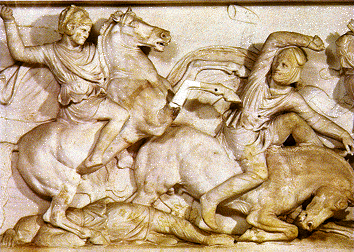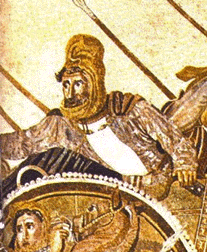|

After the successful siege of Tyre, Alexander continued southwards along the Aegean coast. All the cities in his path yielded
to him except Gaza, which was situated atop a high rock and extremely well fortified. He needed to conquer it before proceeding
into Egypt. After a two month siege the city fell and all male citizens were killed while the women and children were sold
into slavery. Then he continued southward into Egypt, having secured the entire Aegean coast.

The Persian satrap in Egypt wisely decided that trying to stop Alexander would be useless so he was welcomed as a liberator
from the hated Persians and made Pharaoh. It was here that he founded the city of Alexandria.

Alexander welcomed in Egypt
Below is a "detail of a monumental statue of Alexander
the Great from Luxor. The king is portrayed wearing the traditional royal headcloth (nemes)of the Egyptian Pharaoh, with his
characteristic curls shown in Greek style at the forehead. The statue was probably made during Alexander's reign."1.
1. Alexander the Great, Son of the Gods, Alan Fields and Joann Fletcher, The Paul
Getty Museum publication, pg. 54.

|
| Alexander as Pharoah |
He had now secured the Greek mainland from any possible Persian naval attack. It was now time to move to the heart of the
Persian Empire. Alexander left Egypt in the middle of 331 BC in pursuit of Darius.

Alexander
He conquered the lands between the rivers Tigris and Euphrates and found the Persian army at the plains of Guagamela, (near
modern Irbil, Iraq). For Darius this would be a do or die situation because if he lost this battle, it would be the end of
the Persian Empire. He had already been defeated at Granicus and Issus. He chose his battle on a level plain so that he could
most effectively utilized his vast cavalry, which was his main force.

Darius
On the morning of October 1, 331 BC, the two armies met on the battlefield at Guagamela. A furious battle seesawed back and
forth until a gap opened in the Persians right center and Alexander led a charge straight at Darius as he had done at the
Battle of Issus. There was fierce hand-to- hand combat with the Macedonians proving superior. Darius felt threatened with
Alexander and his elite forces so close to him and decided to flee. And, just as at Issus, when the Persians saw their king
fleeing, they decided to do the same. The Macedonians swept through the Persian forces and slaughtered them.

Darius Fleeing
At the moment of Darius departure the battle was far from decided. Although Alexander had forced an important break-through
with his heavy cavalry, just as at Issus, Darius fled far too early. His left wing and most of his center was still intact
and both parties would most likely have had an equal chance of success if Darius could have closed the gap in the left center
and assembled his right wing again. The results of the battles of Issus and Guagamela might have been completely different
if the Persians had a more determined high king. However, once again Darius had escaped because Alexander was occupied in
concluding the battle. The heart of the Persian Empire was now open to Alexander and he turned southward where he obtained
the surrenders of Babylon and Susa and fought his way into Persepolis, the capital of the Persian Empire. After resting his
troops there for several months, he burned and completely destroyed Persepolis. Some historians say this was to avenge the
Persian invasion of Greece and the sack of Athens in 490 BC.

Ruins of Persepolis
Leaving Persepolis, Alexander pursued Darius, now a fugitive in his own country, for hundreds of miles. When he finally caught
up to him, he found the Persian king dead in his coach, assassinated by his own officers. Alexander had the assassins executed
and gave Darius a royal funeral.

Alexander discovers Darius' body

Alexander enters Babylon
Alexander had himself proclaimed high king of Persia and sent letters to all of the Greek cities proclaiming that he had rid
Asia of tyranny. Now, it was on to India.
|



